Sarita was only 13 years old when her parents sold her to the owner of a hotel in Kagbeni, high in the Himalayan Mountains in the Lower Mustang area of Nepal. For the next year, she slaved in the kitchen, preparing meals for the 10-20 men who stayed at the guest house. She was paid 8,000 Nepali rupees for the year, about $91 USD. Sarita hated the work, but without any means to pay for food and lodging, she was trapped. Then one day she met Nicky Chhetri, who along with her two siblings, Dicky and Lucky, had opened Three Sisters Trekking Pokhara Nepal. Nicky was scouring the mountains for underprivileged girls who would agree to be trained as trekking guides. If Sarita could find her own way to Pokhara, Nicky promised, she would be given food, lodging, education, and specialized training that would allow her to become one of the first female trekking guides in what had, up till then, been an exclusively male profession.
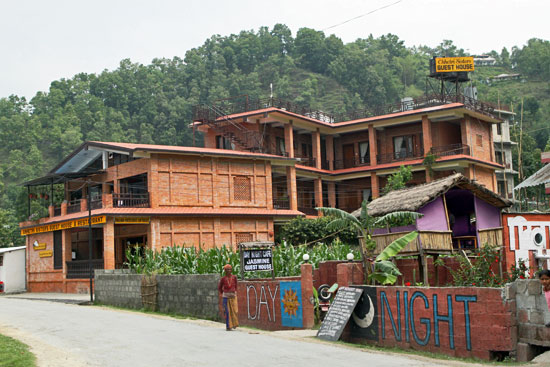
The Chhetri Sisters had seized upon the idea of female guides because many trekkers, especially women, reported feeling unsafe on the trails when accompanied only by male guides and porters. They battled Nepal’s male-dominated society, never giving up on their idea regardless how many times they were told that only men could be licensed as trekking guides. Finally, they gained permission and set up their own school in the top floor of an older building on the north end of Pokhara, using the remainder of the building to house the girls.
Sarita scraped together the few Rupees needed for bus fare but when she arrived in Pokhara she could not find Nicky, so for the next seven months she worked as a laborer in the construction industry until, one day, she found a business card with Lucky’s name and contact information. Full of hope that she was finally on the path to a better life, Sarita presented herself at Three Sisters Trekking, only to be attacked by Lucky when she discovered Sarita was of a lower caste than the sisters. “You can’t come here, we are all Karki,” she sneered. Eventually, the sisters accepted her as a resident, but Sarita’s lower caste was often used as an excuse to treat her like a dog.
“What are you, a buffalo? You eat paper?” screamed Nicky when Sarita ran out of paper to do her schoolwork. “This is paper I buy from my pocket money, you should not waste.”
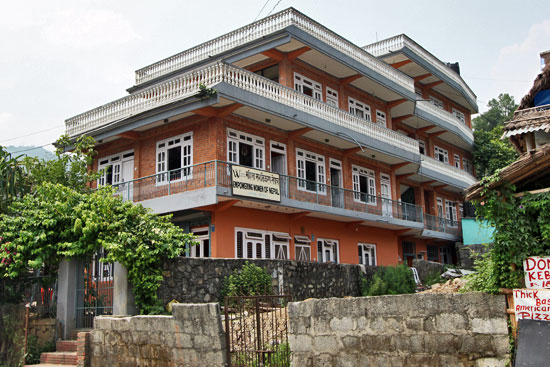
Gradually, 21 girls, ranging in age from five to 16 years old, became residents of the home, which soon prominently displayed the sign Empowering Women of Nepal (EWN), a non-governmental organization (NGO) that the sisters set up for the purpose of soliciting donations to support the children. At first, the girls were paraded out before contributors who visited the center to see first hand the result of their donations. Sarita recalled one such instance: “One day I was sitting in the library with a foreigner, who told me, ‘you must do good work, study hard.’ The visitor explained how he made donations to help us. After this, we were never again called to talk to foreigners. The sisters always told us they paid for everything; they did not want us to know that other people were sending money.”
Jean-Luc Perrotin and his wife, Sabine, were among the earliest supporters of the agency. They met Lucky Chhetri during a trek in the Annapurna Himalayas in May 2006 and were very impressed with the sister’s work to rescue marginalized girls, especially after meeting 13-year old Sarita in the restaurant where she was slaving away. In his delightful French accent, Jean-Luc recalls how their association began. “We want to contribute to the welfare of these children and we start to make some donations, quite heavily.” They returned to Nepal twice each year, sometimes staying with the children in their home and other times in the Chetri sister’s guest house behind the trekking office. “After some times, we realize that all the children…are not well treated, and it seems that all the money was not used for the children – only a small part was used for the children.”
According to three former residents I interviewed (whose names have been changed here to protect their identity), the children lived in deplorable conditions, despite generous monetary gifts from donors around the world. They had use of only one toilet and a shower with cold water. Because the well often ran dry, the girls were allowed to wash their bodies only twice each week and their hair three times per week. On days when there was no water, they bathed in the nearby lake, which is considerably cleaner than the brown well water that was also their only source of drinking water. The girls slept in dorm rooms, four or five bunk beds to a room and usually two girls to a bed. They were expected to rise at 5 a.m., clean their dorm rooms and the bathroom before eating breakfast, after which they walked 45 minutes to school. Anyone who didn’t get up on time risked the wrath of the sisters. “Lucky poured cold water on our faces,” said Sarita.
Though the Chhetri sisters tell donors that the girls are being fed a healthy diet, Sarita claimed that they ate mostly dal bhat, a combination of stewed lentils and white rice, with only one meal per week that included vegetables, chicken or egg. “The sisters tell us all the time that we come from poor families, so we are used to simple food.” Food was also used as a punishment. Another former resident of the house, Ritu, recalled the time she was falsely accused of breaking the sink. “They took away food for two days.”
One December, the Perrotins arrived to find the children shivering in thin, short sleeve shirts, and no socks in near freezing temperatures. When he asked why they did not put jackets on or wrap themselves in blankets, the girls explained they had none. Jean-Luc and Sabine promptly purchased jackets and shawls and distributed them directly to the girls, which angered the sisters. Jean-Luc later heard that the sisters had confiscated the warm clothing. On another occasion, after watching the girls do their laundry by hand, the Perrotins offered to buy a washing machine for the home. “We speak about that with the three sisters and immediately they say ‘Oh, what a wonderful idea.’ Right away we went to market and we buy a brand new washing machine and (it) was supposed to be installed within the children’s house.” After the Perrotins departed, the children were told that their clothes were “too dirty” for the washing machine; the Perrotins later learned that it had been installed in the sister’s private home.
Confiscation was not limited to large ticket items. When Ritu came to live with Chhetri sisters, they took her ring, necklace and watch and refused to give it back when she eventually left. When Jean-Luc brought the girls T-shirts with a picture of the Eiffel Tower, those too were taken away. The girls tell stories of a large room within the facility, stacked to the ceiling with donated merchandise, none of which is ever distributed to them. Disillusioned by what they saw, the Perrotins stopped supporting EWN.
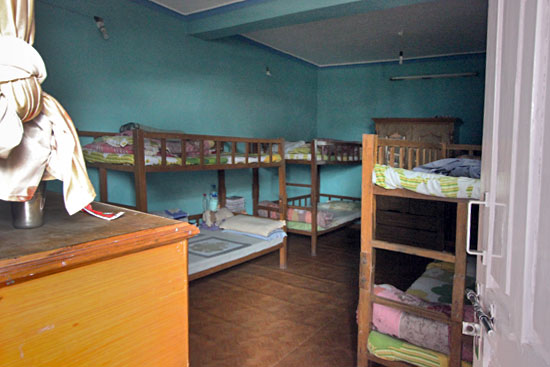
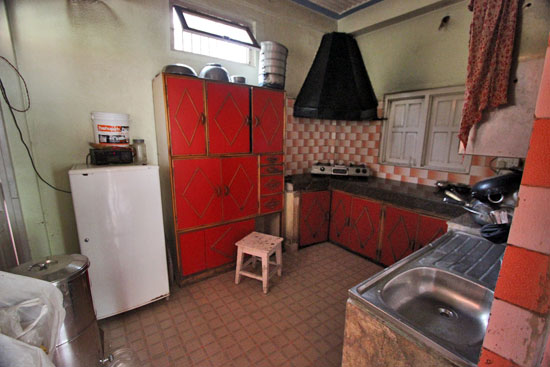
I wanted to witness for myself the conditions of the orphanage and home for the trekking guide trainees, so I showed up unannounced one day. It was mid-afternoon and all the children were in school, but I convinced one of the employees to give me a brief tour of the facilities. It was not as bad as I had expected, given the description of the former residents. Still, considering the trekking office, hotel, and most recently, the palatial private home that the Chhetri sisters have built, I was frankly appalled by the conditions in which the orphans live. They sleep in dark, windowless rooms in the ground floor, into which three or four bunk beds have been crammed, and prepare meals for 20 in a cramped, dirty kitchen.
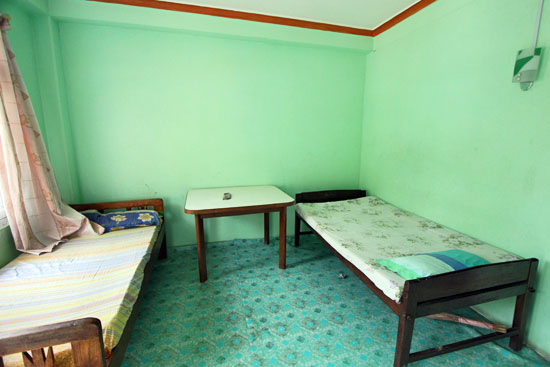
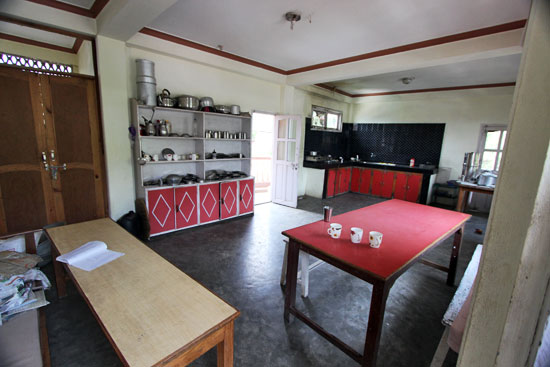
Trekking guide trainees seem to be treated considerably better than the orphans; they have better accommodations on the second level, including decent bedrooms that sleep two to a room and a large, bright kitchen. Twice each year, Three Sisters provides a free 6-month trekking guide apprenticeship program, free accommodation and food at the EWN hostel, as well as free trekking equipment to women from remote rural areas. When they successfully complete their course of study, the girls can begin work as porters, earning 700 Rupees (about $8 USD) per day. If they prove themselves, they can then become trekking guides, who earn 850 Rupees (about $9.50 USD) per day. According to the NGO employee with whom I spoke, had they stayed in their villages, tending fields, at most they would have earned 350 Rupees ($4 USD) per day. While this is certainly an improvement in their circumstances, it must be noted that the going rate per day for a porter and trekking guide is $40-50 USD.
Three Sisters Trekking has undoubtedly provided a better life for the girls who become trekking guides and porters, however I question what percentage of the revenues brought in by the NGO are actually benefiting the girls. Though there is no disclosure of revenues or financial statement provided on their website, in 2009 the sisters partnered with UnitingPeople.com to raise $26,484. As part of this process, they were obliged to provide an audited financial statement to the organization. One line item shows expenses of 672,269 Rupees (about $7,500 USD) NRS for “ice climbing training.” Yet in a supporting document entitled “Rock Climbing and Ice Climbing Report” the sisters disclosed that only one girl was actually trained in ice climbing and four in rock climbing. Given that the site of their rock climbing training is a cliff behind their office, the $7,500 expenditure seems improbable.
Expenses for ‘female trekking guide training” were shown as 1,472,233 Rupees (about $16,500 USD). On the day I visited, the current trekking class consisted of ten girls and I was told the maximum was 15 girls, twice each year. Assuming that they trained 30 girls in 2009, the cost per girl would be 49,074 Rupees (about $550 USD) per girl. While that may seem reasonable, according to Three Sisters website, “At the end of this 4-week training course, the women start work in the apprenticeship program where they will be paid while acquiring field experience working as trekking guide trainees.” Five hundred fifty dollars is a significant amount of money in a country where the per capita income is less than $2,700, according to the World Bank, especially since other line items in the financial statement make it clear that the training costs do not include rental of the building, food, clothes or health care. Another line item shows 43,600 Rupees ($3,633 USD) for Internet. Having lived here off and on for the last three years, I am well aware that Internet costs nowhere near that much.
In 2009, two years after the Perrotins had discontinued their aid to Three Sisters, Jean-Luc reestablished contact with two of the girls, who had by then fled the agency. Hoping to help, the couple returned to Pokhara, where they also reconnected with Devu and Bina, the other two girls they had been supporting through the NGO. Bina related what had happened. “I stayed two years at Three Sisters, but I knew what was going on was wrong, so I confronted them. They said ‘You are not respecting us.’” She was made to sign a document, admitting that she had misbehaved, and was kicked out. The Perrotins decided to directly support all four of the former residents of Three Sisters Trekking and have been doing so ever since.
Ritu married and now has a small child. She recently divorced her husband and is looking for a job. Devu, the youngest, is in secondary school and has moved back in with her mother and step-father. Bina is in grade 12, studying management. Sarita, soon to be 21, has just completed her final year of secondary school and has passed her SLC exam; she will start nursing school in September. When Sarita looks back upon her time at Three Sisters Trekking, she says, “Life is not good there. The Chhetri Sisters treat children like a farm. They grow children, pick them, and use them to get money from other countries. If foreigners want to help, they should give money directly to people who need it instead of to a local NGO.”
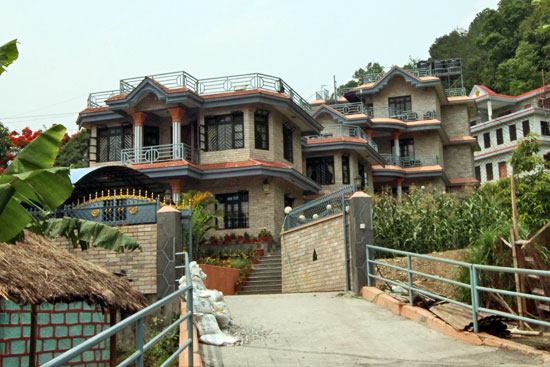
Though there are some deserving and well-run charities in Nepal, many local NGO’s are thinly disguised means to solicit donations, the majority of which line the operator’s pockets. After the country was opened to the world in 1951, money began pouring in via International NGO’s and Nepali quickly learned that the quick and easy road to riches was to set up an NGO and bilk good-hearted tourists. If the private, gated residence of the Chhetri sisters, which is reputed to be the largest house in all of Pokhara Nepal is any indication, it is a lesson that Nicky, Dicky, and Lucky learned well.
Update June 28, 2012, Author’s note: A reader contacted me to correct the price for trekking guides that was quoted in the above article. There was a typographical error in the account; originally it said “the going rate per day for a porter or trekking guide is $50 USD.” It should have said: “the going rate per day for a porter AND trekking guide is $50 USD.” The reader commented: “Barbara do you use pot or so. What kind of nonsense are you writing about. A rate for a porter is around 15 dollar a day, you pay to every company all over Nepal.” Based on this comment, I re-checked with several other trekking companies and was told that the average price per day for guides is $25-30 and for porters the average is $20-25 per day. However, in the pursuit of complete accuracy, I have modified the price in the story to a range of $40-50.
Considering a future visit to Nepal? You’ll want to check out my Essential Travel Guide for Pokhara, Nepal, which is updated regularly.

Hi
I trekked with the Chetri sisters back in 1998 It was a big thing for my wife to support women. We had a great trek and on the last day we tipped everyone. (A lot) The guides and porters and even the sisters…. I think it was Lucky not 100% which one.
About 6 months later we got a call from our guide that the sisters cheated paying the porters their pay because they said they were paid by us. So basically they cheated their employees.
We weren’t very happy about that but nothing we could do about it. I would not go with them again even though the trek was great, it’s hard to swallow someone cheating their employee.
Yep. What I’ve been saying forever. The level of corruption is horrid, and it’s so manipulated and hidden that it’s almost impossible for even long-term volunteers to see, much less the casual visitor.
Absolutely very interesting to read.Go a head.
Enjoy Nepal Treks
Everyone, give credit where due and let Nepali solve the problem- they are fully capable of doing so. Work through Nepali NGOs and be what we are here- bideshi, customers. In my experience, mostly resentment results when we try to fix their problems. Just keep it positive- three sisters has made a step in the right direction!
I’ve come across this just before my upcoming trip to Nepal, and I will be trekking with 3 Sisters – precisely because I was intrigued by the trailblazing nature of their female trekking guide initiative.
I did not actually know about the NGO. If I could offer feedback, I think it would be easier to appreciate the issues you want to raise, if you also describe what parenting norms are typically like in Nepal – particularly to girls and/or wards (not your own kids) – and what home life conditions are typically like.
Comparing it to my own growing up context it’s certainly concerning, but there again two+ generations ago this wouldn’t be abnormal large-family parenting in many Asian countries, including the presently very modern ones. The power distance between parent and child is immense in most traditional Asian cultures, and their authority basically absolute. And you know, most people parent – at least at first – according to what they remember. So it would help to compare it with a Nepali present day baseline.
i donot have any i idea but i have intrest in treeking ..
i am ready to do any think .
i just want to request that please give me a chance i want to do somethink in this field .
i have just recently complete my +2 level n waiting for result.
& hoping for your positive response .
🙂
I met the three sisters in 95 and 96. At first i was truly impressed on what they had achieved and created as women. They shared their dreams with me and i nearly was funding the buy of a piece of land next to their guesthouse. But i noticed that they changed their story almost every week and that they where not always honest with me. At first i thought it was just language and cultural difference in communication but i ended up being really fooled by them so it doesn’t surprise me to read this story .Although i think they will see it different and that has to do with habits and ways of doing business. I was young and super naive
i still can see the things they try to achieve and have achieved in a country that is known for its poverty and “corruption”(just a different way of doing business). So to me the three sisters are no saints but just business women like real CEO’s and it is good to stay critical and aware.and it is beautiful to believe in a dream and a better world but we are a long way away….
I love the questions raised in this expose that all that glitters is NOT gold. My personal experience, living and working in patriarchal societies worldwide is that often women , in those contexts, are the most oppressive and exploitive of other women so the possibility that 3 Sisters has a dark side seems very realistic to me. Having been denied more wholesome avenues to gaining status and power as well as lacking wholesome models for doing so, women in developing and patriarchal cultures often are instruments of the same oppression and exploitation they may have had to suffer.
The question still hanging in the air, for me, is how can I realistically help to break the cycle of exploitation based on gender, caste in my lifetime, for myself, for other women and for the future generatins to come ? Thank you for your courageous commentaries
Hi Dharmabhum: Your question is precisely the issue I have struggled over. I want to help, but I don’t want to support or enable exploitation, in any of its many forms. For me, the answer was to find specific individuals who need help and to assist them directly. The key here is to find someone who can be a participant in the process of changing their life. In other words, the direction has to come from the bottom up. No effort will be successful if I am telling a person what they should do, but if I am helping them to realize their dream, they are empowered and engaged in the process and will ultimately be much more successful than in the top-down model.
I was born in Nepal and have studied, lived, worked and traveled throughout the world. I have a good sense of what goes on in Nepal, which is not unlike anywhere else in the world. Yes Nepal maybe a poor country but corruption is rampant throughout the world, and probably on a much higher scale in the west.
This is a clear case of the kettle calling the pot black. Everyone is preaching to Barbara to be more objective, not one sided, however, as a neutral party I find most of your comments as being one sided too. What could Barbara gain by laying false accusations? Clearly she loves Nepal and takes the time to visit often, has learnt the language and has made the effort to uncover some crucial facts behind this NGO. Whereas the positive comments from the employees of The Three Sisters and those who travel with them, volunteer with them, or train for them could be biased and seems these people have more to gain than Barbara. One blogger, sorry I forget the name is on the money when he says at least Barbara has done due diligence in gathering her facts, whereas several others are simply ranting at her without a single shred of evidence. They blame her for writing lies, but who is to say what is a lie and what is the real truth?
Having lived in Nepal I have witnessed first hand the misappropriation of funds and donation of clothing, baby formula to name a few, being openly sold by influential people who chaired worthy organizations and pocketing the money. So let us not be so naïve.
The only way to resolve this situation is for Three Sisters to be completely transparent with their books and make it accessible if they have nothing to hide about their NGO.
For any of you to go by what the children at the orphanage say is absurd. Would you tell your boss how awful he is or would you save your job? Similarly comments by employees of Three Sisters is of no consequence as they too need their jobs.
At least Barbara has the courage and the willingness to try and bring facts to light to the best of her ability. Orphans are an ongoing problem in Nepal and are so often taken advantage of. First it was the westerners who came and adopted Nepali orphans and took them back to the west where at least a few I know became misfits, drug addicts and very unhappy people. Others are reported to have been used as guinea pigs for scientific research, and many are being used for monitory gains under the guise of humanitarianism. This is a mammoth problem and that Barbara has started the conversation is commendable. I seriously doubt she is doing it for sensationalism, and even if she were, is she any different than the top newspapers and TV stations that are so quick to report sensational news over the more important social issues?
The very fact that Barbara’s blog has attracted a fair amount of controversy is excellent. I sincerely hope that those who are using their NGOs as a money making venture are warned, where as those who are honestly trying to do good become even more empowered. I thank the French couple for their kindness, generosity and dedication to these kids, surely they would not make all this up. Anyhow I wish to thank everyone who has written a comment on this blog as it shows that all of you care enough about Nepal and its children and want to make a difference in your own way.
Thank you Dinah, for your very thoughtful response. I love Nepal and only want the best for the country, so I certainly did not write this article for sensationalism or to purposely generate controversy just to get traffic to the blog. I am happy to see that this issue has seen a great deal more exposure in the past year or so, and that travelers especially are taking more care when selecting a non-profit agency to work with.
You are welcome Barbara, keep up the good work. I think it is very important for the kind hearted and generous people to give to the right causes. Sadly we all know women’s shelters and orphanages have become big business in Nepal, perhaps not unlike the rest of the world where the non-profits pay themselves huge salary packages, and exactly how much trickles down to the kids, battered women or disabled veterans is anyone’s guess. All we can do is give with the hopes that we can make a tiny difference. One of the best causes I found to give to is: Annexe of Siddhi Memorial Hospital in Bhaktapur.
Thks Barbara
fraud is just so very commen in Nepal and part of daily life. Tourists like to think they are making a difference but in reality they are being targeted for money.
I definitely agree Ella, although I do believe there are some really good agencies out there. But it is definitely up to the clients to do some deep due diligence to satisfy themselves that they will be working with a legit agency, and this should include speaking to orphans/women of the agency, outside of the premises, and with a local interpreter.
Hi. I like the article and I liked this reply. I live in Texas, USA. I would certainly be a naive tourist as I expect things to be honest as all of the local charities that I know of, are. Small charities here are generally run by a few dedicated workers on a shoe-string (small) budget (I have worked for at least 5 of them as a volunteer). I just now realized the big difference: small charities here locally are just that, they are to help people as we have so much more opportunities to get money than working for a local non-profit while there are probably not many opportunities to get good paying jobs in nepal. I did have mixed emotions about the orphans thinking that they may not have had anything if not for the sisters but that does not excuse being mean to them. This is my first time hearing personal things about nepal and it was a very interesting view at ground level (personal level). Thanks.
Hi All,
I am a Nepali, in tourism and wanted to agree with Barbara to great extent if not fully for what she brought up by her story or writing. Foreigners who follow lonely planet, trip advisor or beautifully written websites of travel / trekking agency book their trip and have good memories of 2-3 weeks’ trip in Nepal will definitely have no enough time to see Nepal’s reality in tourism. Currently Nepal has over 1000 trekking agencies and most of them have one (or more) NGO run by the families of theirs. If they were doing good for one single family easily 1000 family would have better life isn’t it? And do you think they raise fund enough to help only for one single family? NO. They raise fund enough to make change at least for a village. You imagine what would be the result if those agencies had done jobs as they claim in their beautiful writings on website, or brochures. As a visitor not only with the agency mentioned in Barbara’s story but with anyone you can get good feeling. You will be able to see eyeful of the Himalayan Panorama, ever smiling people, staff speaking good enough English and tasty daal bhat to fill up your belly. The scenery and the situation already does 90% of the job to make you happy no matter with whom you trek. And based on that you blindly say the agency and guide you work with is Better than anyone in the world. But that’s not the truth….. You have to be careful and mindful to know more of the reality what’s going on. And I believe that the writer of this article has seen some of the reality. I appreciate and those who believe in genuine social work and true quality tourism should appreciate the courage of her to bring such topic in light. Namaste
Thank you, thank you, thank you, Ming! As you know, I have suffered threats and verbal abuse over this article, but I stand by it. Nepal is rife with “orphanages” that are little better than human trafficking enterprises, and “women’s empowerment” organizations, many of which help mostly themselves by pocketing the money raised. Not to say all are bad. There are some really good NGO’s helping people, but you have to be very careful and fully research to make sure, and sometimes it is all but impossible to know the truth in a short time.
Thank you for this post Barbara. I live in Pokhara with my nepali husband and he is running a trekkinng agency. I can confirm that a standard rate to hire a porter is $20 and a guide $25 but that is an agency cost. The actual employee will receive 800rs per day for porter and around 1000rs for a guide as salary. The rest will cover their accommodation and food while in trek and any remaining amount is the agency fee and this is standard here.
I had no idea however of the bad treatment the girls receive at Three Sisters and most people think this is the one of the more respectable ngos but I guess sadly this plague is rampant all over Nepal’s ngos which became money making machines… Sad but true in many parts of Asia.
Thanks for your comment AS and for confirming the going rate for guides. 3 Sisters does god work in training women to be trekking guides, but I definitely take issue with the NGO side of their business.
I cannot agree with you. Most of the guides don\’t need to spend as much as their tourists for accomodation and food. I would say 100-250 NPR for dhal bat. So from where the agencies create all these prices? When an agency charges 15 dollars for a porter and 20 dollars for a guide and then in 10 days of trek 2 days you stay in the bus, it is likely that tourists start to question …what have they paid for. Most of guides don\’t even have equipment or a small kit of basic medicines on hand…I travelled to Nepal and everytime I get very upset with the fact that agencies give lots of promises and then they don\’t deliver or they do 50 percent of what they have promised. So why tourists should pay to the agencies? They can hire a guide directly. And for many routes like ABC or EBC you even don\’t need a guide. Just a GPS trekker and a satellite phone and then a great will to bargain. Some trekkers even don\’t pay for accommodation on trek because they eat a lot 🙂 But no agency or a guide tell you about these opportunities. They all get angry when you try to do things on your own.
Hello there, You’ve done an excellent job. I’ll certainly digg it and personally suggest to my friends. I’m sure they will be benefited from this site.
Dear Barbara-
I am writing this message actually sitting in the 3 sisters guest house, relaxing after my 7 day trek with this agency. I don’t know what your motivation is, writing with such I’ll will about people who are working hard to improve the lives of others. 3 sisters is a company, and companies make money. How else do you think they could successfully sustain their social enterprises?? They do not profit from EWN, and there is nothing wrong with profiting from their trekking company.
Here is what I can say about your allegations:
1. Every guide, porter, tea house proprietor, everyone we met along the trail, instantly recognized my fabulous guide as a 3 sisters guide. Why? Because there are no other women doing this!!
2. My guide spoke basically perfect English, knew everything about the area wildlife, history of Nepal, socioeconomic issues, etc etc etc.
3. My guide related to me that her life is infinitely different and better now that she is a guide. How? She has confidence, independence, a modern life, getting teaching certification….. Geeze. I have friends in America who are not as well educated and trained at life.
4. My guide told me at one point that the 3 sisters never married. At once I understood- they put all of themselves into their work, into their girls, into the organization. B, my guide said it was ok they never married, because they have so many children.
5. When I saw your pictures of the “appalling conditions,” I thought this must have been a joke. Have you trekked? Have you seen how people live in the mountains? Holy smokes, that kitchen is rochaklagdo compared to some of the places you would see! I don’t know anything about you, but perhaps you are misguided in your understanding of how people actually live here.
Like I initially said- everywhere we went B. was instantly recognized as a 3 sister guide. Everyone on the trails respected her, and respects this organization. I cannot wait to come back and trek again with 3 sisters, and if I have more time I intend to volunteer with them as well.
I have nothing but gratitude and friendship for my guide, and nothing but respect for this organization.
-Jennifer from Hong Kong
Jennifer, as I have said here repeatedly, I have no issue with the trekking portion of their business. I believe that to be an operation that does help women to raise their standard of living. It’s their NGO, Empowering Women of Nepal, with which I take issue. I will not take the time here to repeat what I have written in numerous comments, but I stand by what was reported in my story.
Thank you , Jennifer, I made the same expereances in Okt/Nov 2014 as you did.
Helga
B.Wolf: I have left this comment of yours on my site as I believe you have a right to your opinion, however the comment you left on my “About” page has been removed because I do not tolerate obscenities on my site. If you persist, all your comments will be removed and you will be banned from leaving any comments.